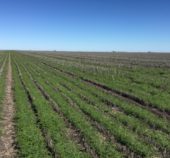Early in October, I attended a field day focused on Root Lesion Nematodes at “Tangalooma” near Jondaryan which is farmed by Alec & Roger Gwynne.
The main upshot from my attendance at this field day was to raise awareness about the risks posed by certain crop rotations to future plantings of crops susceptible to reductions in yield caused by the root lesion nematode (RLN), Pratylenchus thornei.
The Risk
If root lesion nematodes reach significant levels in the black soils of the Downs, the yields of some varieties of wheat, barley and chickpeas can be reduced by up to 70%, 20% and 20% respectively.
Pratylenchus thornei can proliferate on the roots in mungbean and soybean crops without affecting their crop growth and yield.
As a consequence, it could be quite possible to raise the RLN population in your soil quite substantially by growing a susceptible wheat variety such as Strezlecki or Kennedy followed by a chickpea crop (Jimbour or Kyabra) or soybeans (Variety 791) or mungbeans (Jade) in your crop rotations.
Possible Rotation Crops
Sorghum, maize, cotton, millet, pigeon peas, canary seed and sunflower are suitable rotation crops to reduce the Pratylenchus thornei population in the soil. However you might need more than one planting of these crops in succession to reduce the RLN population below the accepted threshold of 2000 Pratylenchus thornei nematodes per kg of soil down to 0-90cms depth.
The wheat variety, Suntop, is currently rated as resistant to RLN.
Spitfire, Wylie, Gregory and Crusader are rated as intermediate in their reaction to RLN.
Soil Testing
The cost of a soil test for RLN was $176 by Crown Analytical Services Pty Ltd in Moree back in May this year when we did some sampling for RLN on one of our grower’s farms. For Black Earth to take the soil samples down to 0-90cms depth, we would ask for a fee for the service which would be dependent on the number of soil tests to be undertaken.
Written by Graham Boulton
Black Earth Cotton Company
3rd Nov 2015




